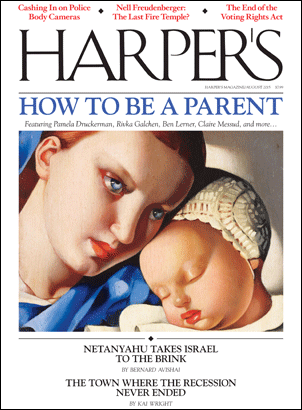Introducing the August Issue
Kai Wright spends two years in a town where the Great Recession never ended; Mya Frazier explores the discomfiting economics of police brutality; Sarah Manguso, Michelle Tea, and eight other contributors discuss parenthood; and Harpers.org launches a metered paywall
 Before diving into the contents of the August issue of Harper’s Magazine, we have a bit of news from the publishing side. Beginning today, Harper’s will offer everyone the opportunity to read one article from the magazine each month on our website, Harpers.org. Our philosophy—that high-quality writing demands (and deserves) a paying audience—hasn’t changed. We already offer first-time subscribers a free issue when we solicit them through the mail. But we recognize that many readers will also appreciate the chance to sample our stories online. Every article we’ve published since 2010, including those in the current issue, will be available through our new metered paywall. (Subscribers, of course, will continue to have access to our entire 165-year archive.) Now is the time to share with your friends and family—via Twitter, or Facebook, or a link in an email—a taste of what they’ve been missing.
Before diving into the contents of the August issue of Harper’s Magazine, we have a bit of news from the publishing side. Beginning today, Harper’s will offer everyone the opportunity to read one article from the magazine each month on our website, Harpers.org. Our philosophy—that high-quality writing demands (and deserves) a paying audience—hasn’t changed. We already offer first-time subscribers a free issue when we solicit them through the mail. But we recognize that many readers will also appreciate the chance to sample our stories online. Every article we’ve published since 2010, including those in the current issue, will be available through our new metered paywall. (Subscribers, of course, will continue to have access to our entire 165-year archive.) Now is the time to share with your friends and family—via Twitter, or Facebook, or a link in an email—a taste of what they’ve been missing.
If you’re a parent or a stepparent, I suggest opening the August issue to our Forum, “How to Be a Parent.” That title comes with a wink because, as our ten contributors demonstrate, there is no instruction manual for parenting—there are only joys and trials, many of which inevitably end in failure. “The point of having a child is to be rent asunder, torn in two,” writes Sarah Manguso. Michelle Tea tries to express what it’s like to watch her wife parent their newborn son, but she finds that “language is a bust. This feeling does not fit inside I love you; even I love you SO MUCH, delivered intensely and with serious eye contact, doesn’t do it.” Karl Taro Greenfeld innocently volunteers to coach his daughter’s basketball team and soon finds himself sending increasingly desperate emails to the other parents describing “new strategies and plans that might finally defeat the evil” opposing team. Each experience our writers describe will resonate with some readers and perplex others—which is precisely the point.
Bernard Avishai, writing from Jerusalem about the April elections that gave Benjamin Netanyahu his fourth term as prime minister, offers a surprising analysis of the turbulent political situation in Israel. With his nuanced understanding of events on the ground, Avishai reveals a truth about Israeli-Palestinian relations that, in retrospect, seems obvious: “Each side is now connected to the other as much as to anywhere else. Talk of separation only mocks the condition that Israelis and Palestinians find themselves in.” While many might want what the Israeli writer Amos Oz calls “a fair divorce,” the modern landscape of the conflict means, quite literally, that such a clean break is no longer plausible.
The poverty rate in Albany, Georgia, is 39.9 percent. Among the town’s African-American residents—who account for two thirds of its 76,000 inhabitants—that rate is almost 42 percent. Kai Wright spent two years visiting Albany, and the portrait he’s drawn—of white flight, shuttered businesses, underfunded schools, and overstretched food banks—is more than poignant; it’s painful. Though Wright finds a population unbowed in the face of economic devastation, even the most optimistic residents know better than to expect a dramatic improvement any time soon. As Major Jones, a longtime resident who lost his job when a local business closed, says, “Sometimes, it’s gotta get worse before it gets better.”
Also in this issue: Mya Frazier on the discomfiting economics of police brutality; Nell Freudenberger on India’s shrinking Parsi population; Sam Sacks on the influence of M.F.A. programs on contemporary war fiction; an excerpt from Ottessa Moshfegh’s novel Eileen; and Randall Kennedy on the past, present, and future of the Voting Rights Act.



